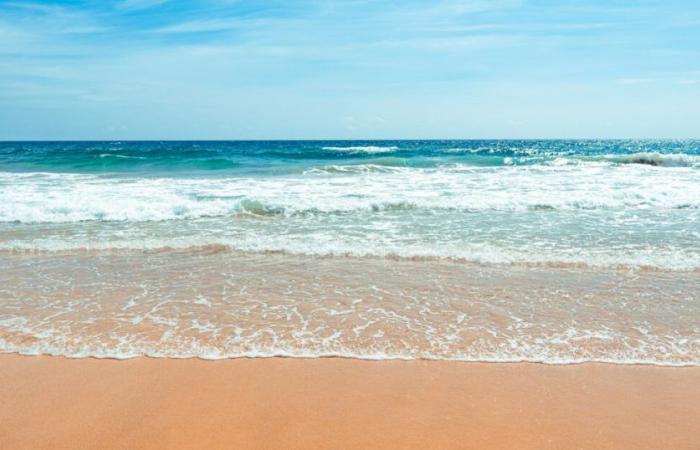Just looking at the vast blue expanse is enough to feel calm. But seaside stays bring us many other benefits.
Walking barefoot on the beach, immersing yourself in the salt water, listening to the sound of the waves… There’s nothing like a stay on the coast to recharge your batteries, treat yourself and escape from your daily life. For 87% of French people, the power of the sea lies in its soothing power (Ifop-Sociovision, 2022). They also give it virtues against stress and anxiety, muscle and joint painor depression. And 78% of respondents believe that seawater has a positive influence on health.
This craze is not new: the first prescriptions for sea bathing date from the 1820s and the term “thalassotherapy“appears in 1865 in the thesis of Doctor La Bonnardière. This is the time when Biarritz (Pyrénées-Atlantiques) becomes a popular holiday destination, Napoleon III trying to treat patients there urinary stones by bathing in the sea. In 1894, the first International Congress of Sea Bathing and Hydrology took place in Boulogne-sur-Mer (Pas-de-Calais). Finally, five years later, Doctor Louis Bagot opened the first thalassotherapy center in Roscoff (Finistère) and promotes treatment of rheumatism in heated sea water.
Thalassotherapy to sleep better and recover
Today, thalassotherapy essentially conveys an image of well-being, relaxation and fitness. Spa visitors often describe such benefits, and doctors note improvements in anxiety, fatigue, venous circulation problems or joint pain. The fact remains that scientific evidence is lacking. Unlike spa treatment, thalassotherapy is neither prescribed by a doctor nor reimbursed by Social Security.
However, in recent years, researchers have taken a serious interest in this question. “We regularly offer our recovering soldiers the opportunity to go to thalassotherapy to get some sleep again. But we wanted to have proof of this effect,” explains Mounir Chennaoui, doctor of physiology and scientific director of the Armed Forces Biomedical Research Institute. Hence a study conducted in 2018 with the Thermes de Saint-Malo (Ille-et -Vilaine) and the University of Paris-Descartes, published in the journal Journal of Sleep Disorders and Therapy. The sleep of 11 volunteer spa guests was analyzed using electrodes during five days of thalassotherapy, the treatments of which included heated sea water baths, massages and seaweed wraps. “From the first night, their average sleep time increased from 5:50 a.m. to 7:05 a.m., then to 7:30 a.m. at the end of the stay. We also noted progress on their general well-being and morale“, describes the physiologist.
Although the benefits of thalassotherapy are not necessarily attributable to immersion in water, it can partly explain them: “Thanks to floating, complete relaxation becomes accessible. If you extend the bath for a long time, in a few dozen minutes this method leads to a state that is between wakefulness and sleep. Breathing becomes regular, slows down and descends to the abdominal level, the round of thoughts ceases”, underlines Michel Le Van Quyen, researcher at Inserm, in his work Brain and Nature (ed. Flammarion, 2022).
Less stress by the sea
Beyond thalassotherapy, simply living near the coast is beneficial. A vast European project called “Blue Health” looked into the issue among 18,000 people living in 18 countries. In 2020, its conclusions are clear: Mental health care is less common among people living by the sea than among urban residents far from the coast. Results confirmed by Mathew White, a British environmental psychologist who has conducted around fifty studies on the subject over the last ten years. In the largest, involving 90 researchers and published in 2013 in the journal Health & Placehe showed that English populations living near the coast are in better healthThe researcher explains this by the stress reduction and theincreased physical activity (desire to swim, walk, etc.). It also shows that Access to the sea limits addictionsparticularly the consumption of alcohol and tobacco.
We have all already felt better during vacation by the sea, but by what physiological mechanism? We don’t really know, but “when we see blue, researchers have noticed that blood pressure decreases and the rate of breathing and heartbeat slows down. Blue light would have a direct impact on a pigment in the retina – melanopsin – which signals the presence of daylight to the brain and plays a stimulating role in certain cognitive functions”, writes Michel Le Van Quyen in his book.
The calming power of the aquarium
The simple contemplation of an aquarium would also have a calming effectparticularly interesting for people with Alzheimer’s disease or mental disorders. In 2016, a team of researchers, including Mathew White, compared the state of well-being of several groups when faced with an aquarium with more or less fish. Individuals admiring the greatest underwater biodiversity had the slowest heart rate and reported the greatest well-being. Many hospitals have equipped themselves with aquariums.
Good sea air, rich in oxygen
Breathing sea air does us good, but its benefits are not well established scientifically. A commonly accepted hypothesis is that sea air is richer in oxygen and less loaded with carbon dioxide and pollutants. This less pollution could contribute to better health.
Furthermore, another explanation would be based on negative ion theory, which was the subject of some studies in the 1990s. These ions carrying a negative electric charge are strongly present by the sea (but also in forests or mountains). “They would be beneficial for our health, by improving the oxygenation of our tissues, the quality of our sleep, concentration and mood”, supposes Doctor Guillaume Barucq, general practitioner in Biarritz and promoter of the surf therapy. But this theory is scientifically controversial and needs to be supported by other studies.
There is still much to discover but, after several decades of fallowness, research on the links between sea and health is relaunching at European level. The Sea, Oceans and Public Health in Europe network has brought together around fifty researchers since 2020. They work in particular on The beneficial relationship between the marine environment and mental health. Until further exciting studies are done, there are no side effects to spending time by the sea… and already great benefits!
The benefits of washing your nose with sea water
It’s proven, nasal washes with saline solutions are an effective way to prevent or treat a cold. It has also become a daily hygiene measure recommended by doctors. sea water sprays thin nasal mucus, clear the nose of pollen and dust, and prevent the proliferation of microbes in the nasal passages. At the time of the pandemic, several scientific articles showed that these washes limited the symptoms of Covid-19.
Cold water baths are not without risk
This practice is fashionable: rightly so or not? In cold water, the constriction of the vessels causes a reflux of the blood mass towards the interior of the body, which increases blood pressure and heart rate. When leaving the bath, the body warms up and the blood return to the extremities provides feeling of well-being, report the followers, who feel in better shape after many immersions. Athletes appreciate them after exercise, about ten minutes in water at 10-15°C, to recover and reduce muscle soreness. However, studies are lacking. Are these baths suitable for everyone? After 50 years or in the event of a health problem, particularly cardiac (hypertension), Dr Barucq advises “to have a check-up with your GP. And in all cases, you gradually enter the water and always accompanied”, the main risks being hypothermia or a cardiorespiratory accident.
You may also be interested in:
When nature soothes our psyche
Can you drink sea water?
What is the proportion of salt in sea water?






